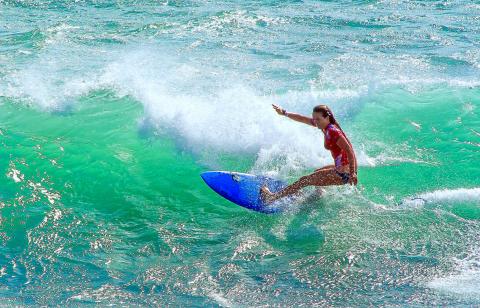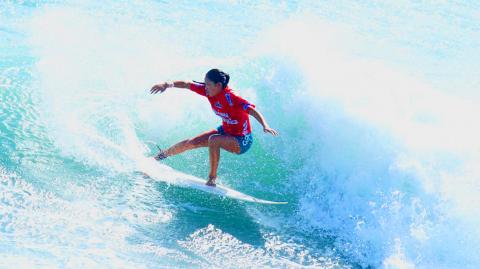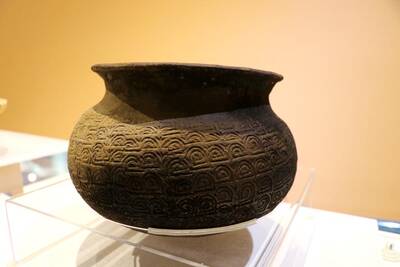While the name “Jinzun” doesn’t immediately evoke images of beckoning swells and swaying palm trees the way that Kuta Beach, Waikiki or the Sunshine Coast does, this sleepy fishing village just off Highway 11 on Taiwan’s southeast coast is attracting more international surfers each year. On Nov. 25, hundreds of surfers — including 60 from overseas — will descend on the black sand beach to compete in the fifth annual Taiwan Open of Surfing.
Such a spectacle would have been unheard of 10 years ago. For decades, Taiwan’s pristine coastline was sealed off for military drills. Even after the lifting of martial law in 1987, few people ventured out to the coast, as they were taught to fear the ocean. Just a few months ago, shop owners responded with astonished stares when I inquired about surfboard rentals in Dulan, a few kilometers south of Jinzun in Taitung County.
“All of this is changing though,” says Kathy Tang (唐詠誼), the event director of the Taiwan Open of Surfing. “I’ll bring my children to the beach and teach them about water safety, even if the lifeguard — if there is a lifeguard — doesn’t know too much about it.”

Photo courtesy of Taiwan Open of Surfing
When we meet for coffee near Taipei 101, at first glance, Tang’s super-sleek pantsuit and hassled appearance — her phone is constantly ringing — seems to belie her love for the ocean. Although her tan suggests that she’s a surfer girl at heart.
“When it gets too busy in Taipei, I just take off and head to the Sunshine Coast in Australia,” Tang tells me.
THE TAITUNG EXPERIENCE

Photo courtesy of Taiwan Open of Surfing
Learning to swim is not compulsory in most local schools across Taiwan, and many lifeguards are still inadequately trained. Tang thinks a system like Australia’s — where lifeguards have to pass a series of rigorous tests and renew their license every year, and having flags on the beach to indicate when it’s safe to swim — would benefit Taiwan’s beach-goers and reduce the number of drownings every year.
But the fact that one of the biggest surf competitions in Asia is taking place in Jinzun next week is already a promising sign. For Tang, though, the dream is simply to see Taitung County become a laidback, family-friendly surf destination in comparison to more hyped-up places like Bali or Phuket.
“We don’t want surfers to just come to Taitung, surf and go home,” Tang says.

Photo courtesy of Taiwan Open of Surfing
Instead, she believes that it’ll be a more memorable experience for them if they also have a chance to explore Taitung’s parks and mountains with their families and kick it back with a beer on the beach in the evening — just like they would during a vacation.
EMBRACING THE LIFESTYLE
While raising Taiwan’s international reputation as a surf destination is important, so is fostering the local surf culture.
“We need to show [people] that they don’t need to travel all the way to Indonesia or Thailand to go to a beach.”
In fact, from Donghe down to Dulan, Taitung’s beaches offer consistent swells and warm waters all year round.
When I ask Tang about the competition’s male-to-female ratio, she says that only 10 percent of the surfers are female, and out of that, just a handful are Taiwanese. She speculates that it’s because women are still afraid of getting a tan, although an increasing number are also starting to don bikinis and embracing a lifestyle where surfing is seen as healthy and fashionable.
“There are photographers at these competitions, so the element of being seen is motivation enough,” Tang says.
It wasn’t exactly the answer I was hoping for. But it’s a start.
The Taiwan Open of Surfing kicks off on Nov. 25 at Jinzun Harbor and lasts until Nov. 29.
Event notes
What: Taiwan Open of Surfing (台灣國際衝浪公開賽)
When: Nov. 25 to Nov. 29
Where: Jinzun Harbor, Donghe Township, Taitung County (台東縣東河鄉金樽漁港)
Admission: Free
On the net: www.facebook.com/taiwanopenofsurfing
Getting there: Take the express train from Taipei Main Station (台北火車站) to Taitung Station (台東火車站); train ride takes three and a half hours. Take a taxi (NT$800) or bus 8101 (NT$160) from Taitung Station to Jinzun (金樽); ride is approximately one hour.
Accommodation: There are a number of B&Bs and hostels in Donghe and Dulan but it’s best to book early

Sept. 1 to Sept. 7 In 1899, Kozaburo Hirai became the first documented Japanese to wed a Taiwanese under colonial rule. The soldier was partly motivated by the government’s policy of assimilating the Taiwanese population through intermarriage. While his friends and family disapproved and even mocked him, the marriage endured. By 1930, when his story appeared in Tales of Virtuous Deeds in Taiwan, Hirai had settled in his wife’s rural Changhua hometown, farming the land and integrating into local society. Similarly, Aiko Fujii, who married into the prominent Wufeng Lin Family (霧峰林家) in 1927, quickly learned Hoklo (commonly known as Taiwanese) and

The low voter turnout for the referendum on Aug. 23 shows that many Taiwanese are apathetic about nuclear energy, but there are long-term energy stakes involved that the public needs to grasp Taiwan faces an energy trilemma: soaring AI-driven demand, pressure to cut carbon and reliance on fragile fuel imports. But the nuclear referendum on Aug. 23 showed how little this registered with voters, many of whom neither see the long game nor grasp the stakes. Volunteer referendum worker Vivian Chen (陳薇安) put it bluntly: “I’ve seen many people asking what they’re voting for when they arrive to vote. They cast their vote without even doing any research.” Imagine Taiwanese voters invited to a poker table. The bet looked simple — yes or no — yet most never showed. More than two-thirds of those

In the run-up to the referendum on re-opening Pingtung County’s Ma-anshan Nuclear Power Plant last month, the media inundated us with explainers. A favorite factoid of the international media, endlessly recycled, was that Taiwan has no energy reserves for a blockade, thus necessitating re-opening the nuclear plants. As presented by the Chinese-language CommonWealth Magazine, it runs: “According to the US Department of Commerce International Trade Administration, 97.73 percent of Taiwan’s energy is imported, and estimates are that Taiwan has only 11 days of reserves available in the event of a blockade.” This factoid is not an outright lie — that

The People’s Republic of China (PRC) yesterday paraded its military hardware in an effort to impress its own population, intimidate its enemies and rewrite history. As always, this was paced by a blizzard of articles and commentaries in the media, a reminder that Beijing’s lies must be accompanied by a bodyguard of lies. A typical example is this piece by Zheng Wang (汪錚) of Seton Hall in the Diplomat. “In Taiwan, 2025 also marks 80 years since the island’s return to China at the end of the war — a historical milestone largely omitted in official commemorations.” The reason for its